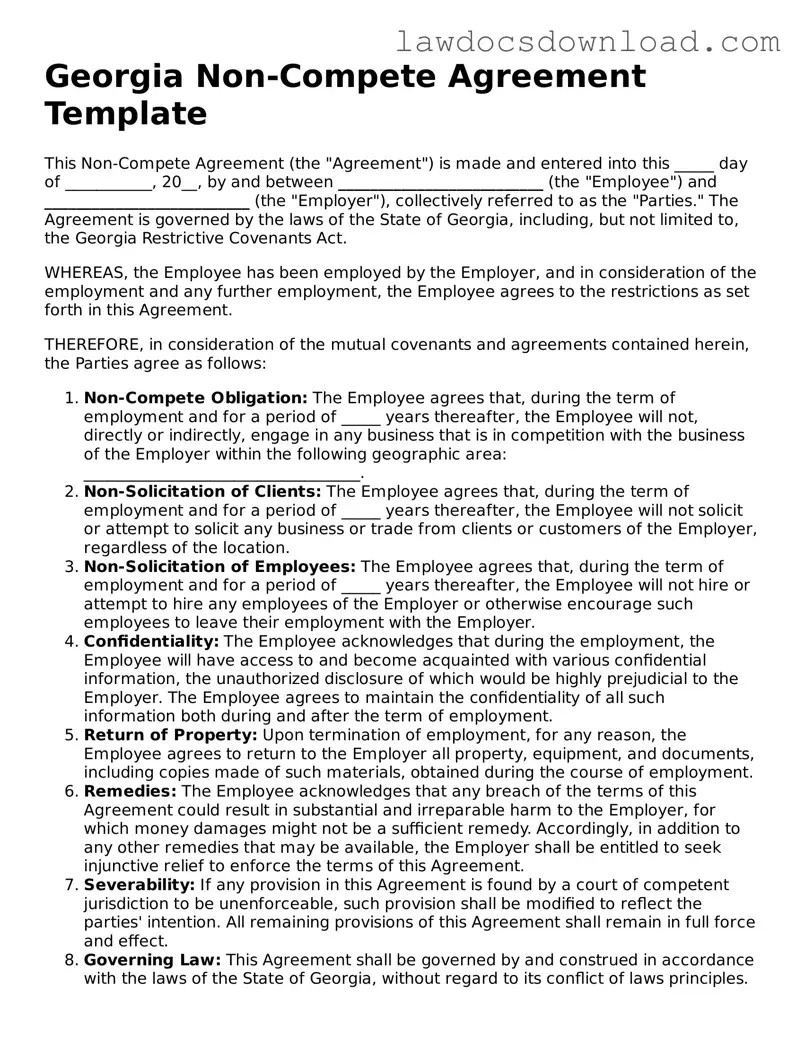Georgia Non-Compete Agreement Template
This Non-Compete Agreement (the "Agreement") is made and entered into this _____ day of ___________, 20__, by and between __________________________ (the "Employee") and __________________________ (the "Employer"), collectively referred to as the "Parties." The Agreement is governed by the laws of the State of Georgia, including, but not limited to, the Georgia Restrictive Covenants Act.
WHEREAS, the Employee has been employed by the Employer, and in consideration of the employment and any further employment, the Employee agrees to the restrictions as set forth in this Agreement.
THEREFORE, in consideration of the mutual covenants and agreements contained herein, the Parties agree as follows:
- Non-Compete Obligation: The Employee agrees that, during the term of employment and for a period of _____ years thereafter, the Employee will not, directly or indirectly, engage in any business that is in competition with the business of the Employer within the following geographic area: ___________________________________.
- Non-Solicitation of Clients: The Employee agrees that, during the term of employment and for a period of _____ years thereafter, the Employee will not solicit or attempt to solicit any business or trade from clients or customers of the Employer, regardless of the location.
- Non-Solicitation of Employees: The Employee agrees that, during the term of employment and for a period of _____ years thereafter, the Employee will not hire or attempt to hire any employees of the Employer or otherwise encourage such employees to leave their employment with the Employer.
- Confidentiality: The Employee acknowledges that during the employment, the Employee will have access to and become acquainted with various confidential information, the unauthorized disclosure of which would be highly prejudicial to the Employer. The Employee agrees to maintain the confidentiality of all such information both during and after the term of employment.
- Return of Property: Upon termination of employment, for any reason, the Employee agrees to return to the Employer all property, equipment, and documents, including copies made of such materials, obtained during the course of employment.
- Remedies: The Employee acknowledges that any breach of the terms of this Agreement could result in substantial and irreparable harm to the Employer, for which money damages might not be a sufficient remedy. Accordingly, in addition to any other remedies that may be available, the Employer shall be entitled to seek injunctive relief to enforce the terms of this Agreement.
- Severability: If any provision in this Agreement is found by a court of competent jurisdiction to be unenforceable, such provision shall be modified to reflect the parties' intention. All remaining provisions of this Agreement shall remain in full force and effect.
- Governing Law: This Agreement shall be governed by and construed in accordance with the laws of the State of Georgia, without regard to its conflict of laws principles.
- Entire Agreement: This Agreement contains the entire understanding between the Parties and supersedes all prior and contemporaneous agreements and discussions, whether oral or written, between the parties regarding the subject matter hereof.
IN WITNESS WHEREOF, the Parties have executed this Non-Compete Agreement as of the date first above written.
Employee Signature: ___________________________________
Employer Signature: ___________________________________
Date: __________________

